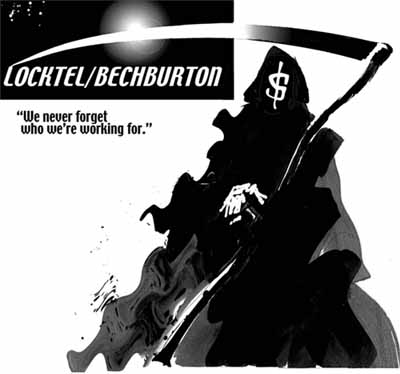Untitled Document

In a December 21 announcement that surprised many, powerful Lockheed Martin and
its academic bidding partner, the University of Texas, failed to win the plum
annual management contract for Los Alamos National Laboratory (LANL). The winning
team consisted of Bechtel National, its roster of crony corporations, and the
University of California (UC), the lab's manager since the Manhattan Project.
Despite UC's name still being on the contract, this signals a big shift for
the lab. Like many of the nation's resources under this administration, it is
being privatized and placed into corporate hands, a little further from public
view.
Bechtel's victory may be a cause for surprise, but not necessarily for relief.
Department of Energy (DOE) officials say Bechtel/UC will provide better "integration
of the nuclear weapons complex." Could "integration" be code
for monopoly? Bechtel subsidiaries already co-manage Yucca Mountain, the Nevada
Test Site, Y12, Savannah River and Pantex -- and they subcontract at eight additional
DOE sites. UC still runs Lawrence Livermore and Lawrence Berkeley Labs, along
with Los Alamos. Perhaps DOE couldn't risk introducing a new cast of characters
to the legacy of waste, contamination and mismanagement plaguing the national
complex, more of which undoubtedly would have been exposed by a clean sweep
at LANL.
How much do we know about the privately owned Bechtel? For starters, they have
a long and checkered past with DOE: cost overruns and delays at Hanford, suppressed
records of a nuclear accident at Oak Ridge, fines for safety violations at Pantex,
Oak Ridge, Paducah . . . Outside of DOE, Bechtel has attained infamy for EPA
citations for hazardous waste spills, delays and overruns at the Big Dig in
Boston, and investigation by the Nuclear Regulatory Commission for their work
at Three Mile Island.
Bechtel has no monopoly on expensive mistakes. UC has also racked up quite
a track record. Consider a decade of management, environmental, safety and security
scandals, topped off by last year's costly operations stand-down and recent
allegations of missing plutonium (over 700 kilos).
During the award announcement a DOE official noted "concerns with regards
to past [UC] performance," a polite reference to the fiscal and safety
problems. In fact, DOE was so displeased with UC performance in 2004 that it
withheld two-thirds of the performance-based LANL management fee. Nevertheless,
DOE predicts that Lab operations will be improved simply because the corporate
partners will bring "what they do best" to LANL management -- while
giving no details.
The retention of UC implies some continuity in Lab operations. But this gravy
train has more drivers now. We will be watching closely as Bechtel and its network
of corporate entities takes the reins of day-to-day nuclear lab operations.
Will it become even more difficult to obtain information about what's happening
and planned, now that the lab -- so long shielded from scrutiny by national
security and academic aura -- hits the profit-driven corporate trail? How many
veils of secrecy will we now have to penetrate to get the real story? It's never
been easy.
Three bidding teams vied for the contract: Bechtel/UC; Lockheed Martin/UT;
and Nuclear Watch New Mexico/Tri-Valley CAREs. Only the last team offered a
real alternative, proposing a new Lab Office of Nonproliferation to shift away
from LANL's aggressive nuclear weapons emphasis, so as to comply with the 1970
Non-Proliferation Treaty -- and with international opinion. By example, this
would have provided solid leadership in countering the nation's gravest security
threat (recognized by both presidential candidates) -- the proliferation of
nuclear weapons. Sadly, DOE summarily rejected that proposal, and now the bid
has been awarded to more "big business as usual."
Scott Kovac is the operations and research director of
Nuclear Watch of New Mexico,
and Sasha Pyle is the editor of The Watchdog Newsletter.

